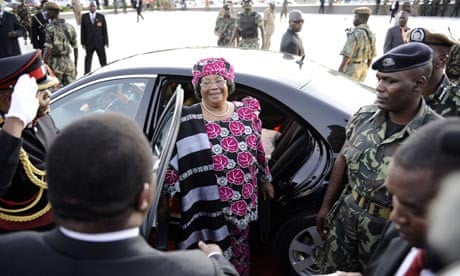Malawi's new president has pledged to lift the country's ban on homosexuality, breaking ranks from much of Africa where such activity remains a crime.
Joyce Banda, who came to power in April on the death of her predecessor, said in her first state of the nation address on Friday: "Indecency and unnatural acts laws shall be repealed." She described the measure as a matter of urgency.
Elsewhere in the speech, Banda said her government wanted to normalise relations with "our traditional development partners who were uncomfortable with our bad laws".
But repealing a law requires a parliamentary vote and, although Banda's party commands a majority, it is unclear how much support the move would have in this socially conservative nation.
Malawi was widely condemned for the conviction and 14-year prison sentences given in 2010 to two men who were arrested after celebrating their engagement and were charged with unnatural acts and gross indecency.
The president at the time, Bingu wa Mutharika, pardoned the couple on "humanitarian grounds only", while claiming they had "committed a crime against our culture, against our religion, and against our laws".
Mutharika died from a heart attack in April. Banda, who was vice-president, stepped in to serve out his term, which ends in 2014. She has hit the ground running with a cabinet reshuffle, the sacking of the police chief and sweeping reforms to break from Mutharika's autocratic rule.
Her audacious plan to legalise homosexuality was welcomed by the campaigner Gift Trapence, executive director of the Centre for the Development of People. "If that's what the president said, Malawi is going in the right direction in terms of human rights and meeting international human rights standards, and saying people are equal irrespective of sexual orientation," he said.
Banda has previously demonstrated her liberal attitudes on the issue, he continued. "When she was vice-president she was invited to address a group of religious leaders and she spoke in favour of including LGBT communities in HIV interventions."
Trapence said Banda's stand offers hope in a continent where homosexuality is criminalised in 37 countries. "It has come at the right time as the African Union is coming to attend a summit in Malawi. This sends a good message to the African heads of state who will attend."
Trapence said the gay couple whose engagement caused a storm, Tiwonge Chimbalanga and Steven Monjeza, were no longer together. Chimbalanga gained asylum in Cape Town, South Africa, while Monjeza is serving a three-year prison sentence for theft.
"They will be happy at this decision," he added. "They will look back at how they suffered and were incarcerated and have a smile that at least they did something to influence the sodomy laws under which they were convicted."
Wapona Kita, one of Malawi's leading human rights lawyers, said he welcomed the president's announcement. "She has done the right thing. The repeal of this bad law is long overdue."
The law is "unconstitutional against international human rights standards", he added.
Undule Mwakasungula, executive director of the Centre for Human Rights and Rehabilitation, said: "This is good news for us as we have been advocating for these sodomy laws to be reviewed or repealed as part of all the bad laws. Now that president Joyce Banda has indicated that the sodomy laws will be part of the laws to be repealed, this is very welcome development."
In South Africa, the only African country with laws protecting gay rights, activist Mark Heywood said Banda would have international support. "I hope that she is persuasive enough in her own country," he told the Associated Press. "It's really important for other African countries other than South Africa to move in this direction. Symbolically, I think it is very important for Africa."
A report this week from Kenya and Uganda by the watchdog Human Rights First found that African homosexuals who fled persecution in their countries were abducted, beaten and raped in the places where they sought asylum.
It cited examples including two refugee women in Uganda who were abducted and raped because they had been assisting LGBT refugees, five cases of "corrective rape" of lesbian or transgender male refugees in Uganda and a gay Somali teenager in Kenya who was doused in petrol and would have been set on fire if not for the intervention of an older Somali woman.
Human Rights First, a US-based non-governmental organisation, called on Hillary Clinton, the secretary of state, to help make sure that LGBT refugees gain access to safety and protection from violence.
